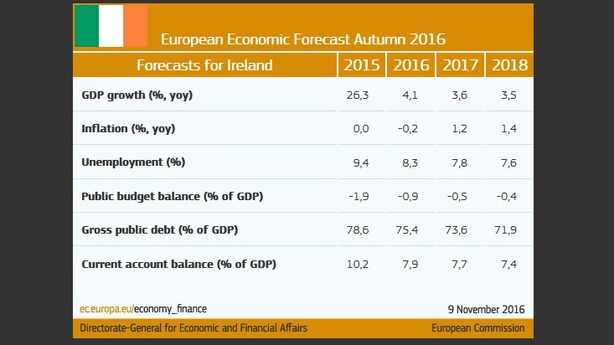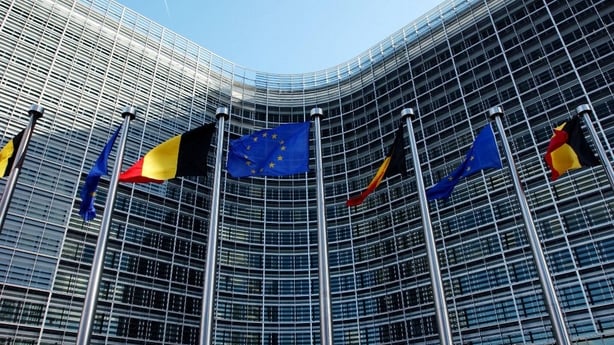The European Commission has said that it continues to see strong underlying activity in the Irish economy.
In its latest economic update, the Commission said this would lead to GDP growth of 4.1% in 2016, 3.6% in 2017 and 3.5% in 2018.
The Commisson also said that the country's public debt and deficit should continue to fall steadily, though we still face some risks, including Brexit.

Meanwhile, the European Commission has today raised its euro zone growth forecast for this year but trimmed it for next year. It warned that the economy faced new challenges due to Brexit and increased volatility.
The European Commission, the EU's executive arm, said economic growth this year would reach 1.7% in the 19-nation euro zone and slow to 1.6% in 2017.
But the EU nearly halved its economic growth outlook for Britain in 2017 due to the impact of the Brexit vote to leave the bloc.
"Growth is projected to almost halve in 2017, to 1% from 1.9% in 2016 reflecting the impact of heightened uncertainty following the referendum and its impact on business confidence and broader economic conditions," the EU said in its autumn economic forecasts.
British economic growth is however expected to edge up slightly in 2018 to 1.2% because of a rise in exports even as domestic demand remains low, the EU said.
"Uncertainty is likely to remain high as negotiations on the future relationship between the UK and EU continue, impeding the extent of the rise in growth in 2018," it said.
Britain voted to leave the EU in a referendum on June 23.
Prime Minister Theresa May has said she will formally trigger the two-year divorce process by the end of March 2017 but Brussels and London face gruelling negotiations on a future trade deal.
The EU forecast warned that the uncertainty was also likely to harm the wider economy of the 19-nation euro zone which had so far "shrugged off" the impact of Brexit.
What has already been observed is a sharp increase in uncertainty, which is expected to hamper economic dynamics primarily in the UK but also in the EU," it said.

The EU forecast warned that the uncertainty was also likely to harm the wider economy of the 19-nation euro zone which had so far "shrugged off" the impact of Brexit. "
What has already been observed is a sharp increase in uncertainty, which is expected to hamper economic dynamics primarily in the UK but also in the EU," it said.
"In these volatile and uncertain times, no effort must be spared to safeguard and strengthen this recovery - and ensure that all sections of society feel its benefits," commmented EU Economics Affairs Commissioner Pierre Moscovici.
Asked about the impact of the Trump vote in the US, Moscovici stressed the need to boost economic recovery.
"The frustration expressed in the US clearly echoes that of European voters," Moscovivi said.
"Many of our citizens feel excluded from the economic recovery and many of them feel disconnected from government," he said.

Inflation, long stuck near negative territory, would accelerate sharply, the commission said today, as rising oil prices began to lift consumer prices.
The commission said inflation in the euro zone would hit 1.4% in 2017, up from an expected 0.3% for 2016.
This will come as a relief to the European Central Bank which has embarked on a controversial stimulus programme to get inflation nearer to the official target of close to 2%.
Growth in all 28 EU nations would hit 1.8% in 2016, the commission said, with a drop to 1.6% next year.
Greece will be the only euro zone member in recession this year with a contraction of 0.3% as fallout from debt crisis continued to affect the economy.
But the economy would turn around sharply to 2.7% expansion next year, the commission said.
The Commission forecasts also cleared the air for France, which will achieve enough growth this year to reduce its deficit to 2.9% of GDP, just inside the EU's 3% limit, according to the estimates.

